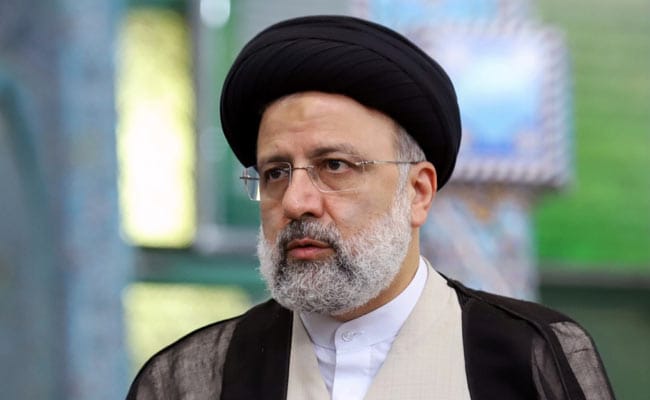
File photo
Tehran:
Iran on Sunday urged Israel not to retaliate militarily in an unprecedented overnight attack that Tehran said was a justified response to a deadly attack on its consulate building in Damascus.
“The matter can be considered closed,” Iran’s mission to the United Nations posted on social media platform X, hours after the operation began on Saturday night.
“However, if the Israeli regime makes another mistake, Iran’s response will be even harsher,” the Iranian delegation warned.
Iranian President Ibrahim Raisi warned Israel and its allies on Sunday not to take any “reckless” actions after Tehran launched drone and missile attacks, marking Iran’s first direct military attack on Israeli territory.
“If the Zionist regime (Israel) or its supporters display reckless behavior, they will receive a decisive and stronger response,” Lacey said in a statement.
Tehran’s foreign ministry summoned the ambassadors of France, Britain and Germany after many countries condemned Iran’s attack “because of the irresponsible stance taken by some officials in these countries regarding Iran’s response,” a statement said.
Late Saturday, Iran’s Revolutionary Guards announced they had launched “dozens of drones and missiles” at military sites on Israeli soil.
Iran’s mission to the United Nations said “Iran’s military action is in response to the Zionist regime’s aggression against our diplomatic premises in Damascus earlier this month,” calling it a “legitimate defense.”
The Israeli military said it had shot down 99% of drones and missiles with help from the United States and other allies, and declared that the Iranian attack had been “thwarted.”
Iranian Army Chief of Staff Mohammad Bagheri said the attack had “achieved all its objectives” and had “no intention to continue this operation.”
Bagheri said Iran’s retaliatory targets were an “intelligence center” and an air base from which Tehran said Israeli F-35 fighter jets took off on April 1 to attack the Damascus consulate.
“Both centers were severely destroyed,” he said, although Israel insisted the attack caused only minor damage.
Attack on “Telegraph”
Experts said Saturday’s slow-moving drone strike was a show of strength but also left some room for maneuver.
Nishank Motwani, a senior analyst at the Australian Institute of Strategic Studies, said: “Iran’s attacks on Israel appear to be an attempt to demonstrate that it can strike using different capabilities, complicating the ability to suppress attacks while also providing opportunities for Blocking Escalation Provides an Exit.” Washington Institute for Policy Studies.
“If Tehran chooses to cross a range of vectors, the situation could escalate,” Motwani said.
Iranian authorities have repeatedly vowed to “punish” Israel after the Iranian consulate in Damascus was razed to the ground over the past two weeks, killing seven guards, including two generals of the Quds Force.
Iran blamed Israel for the attack.
Days after the attack, Iran’s Supreme Leader Ayatollah Ali Khamenei said Israel would be “slapped for this action.”
Israel has been a sworn enemy of the Islamic Republic of Iran since the 1979 Iranian Revolution.
Iran regularly calls for the destruction of Israel and supports the Palestinian cause, one of the pillars of the Islamic revolution.
However, until Saturday, Tehran had not launched a direct attack on Israel.
Since the war between Israel and the Palestinian militant group Hamas broke out in Gaza on October 7, it has instead supported members of the so-called “axis of resistance” against Israel, including Lebanese Hezbollah and Yemen’s Houthi rebels.
Hours before Saturday’s attack, Iran seized an Israeli-linked container ship in the Gulf in what Washington called “an act of piracy.”
“The next slap will be harder”
Overnight, Tehran warned the United States, urging it to “stay away” from conflict with Israel.
Iran’s foreign ministry said Tehran “will not hesitate to take defensive measures if necessary” to protect its interests from any aggressive military action.
Foreign Minister Hussein Amir-Abdullahian later said Tehran had notified neighboring countries before the military operation and stressed that its goal was to “punish the Israeli regime.”
“We are not targeting the American people or American bases in the region,” he said, but he warned that Iran could target American military positions involved in “defending and supporting” Israel.
A mural unveiled overnight in Tehran’s Palestine Square warned that “the next slap will be even harder.” Thousands of people gathered there, chanting “Death to Israel” and “Death to America.”
Before Tehran launched the attack, Israel warned Iran that it would suffer “the consequences of choosing to further escalate the situation.”
Israel has yet to say what a possible response might look like.
Experts said that an Israeli attack on Iranian territory cannot be ruled out, possibly targeting military or nuclear facilities.
Iran’s Imam Khomeini International Airport and domestic Mehrabad Airport will remain closed until 06:00 am (0230 GMT) on Monday as a precautionary measure, ISNA news agency reported.
Many international airlines have suspended flights over Iranian airspace.
Countries such as Russia and France have asked their citizens to avoid traveling to Iran and Israel.
(Except for the headline, this story has not been edited by NDTV staff and is published from a syndicated feed.)






